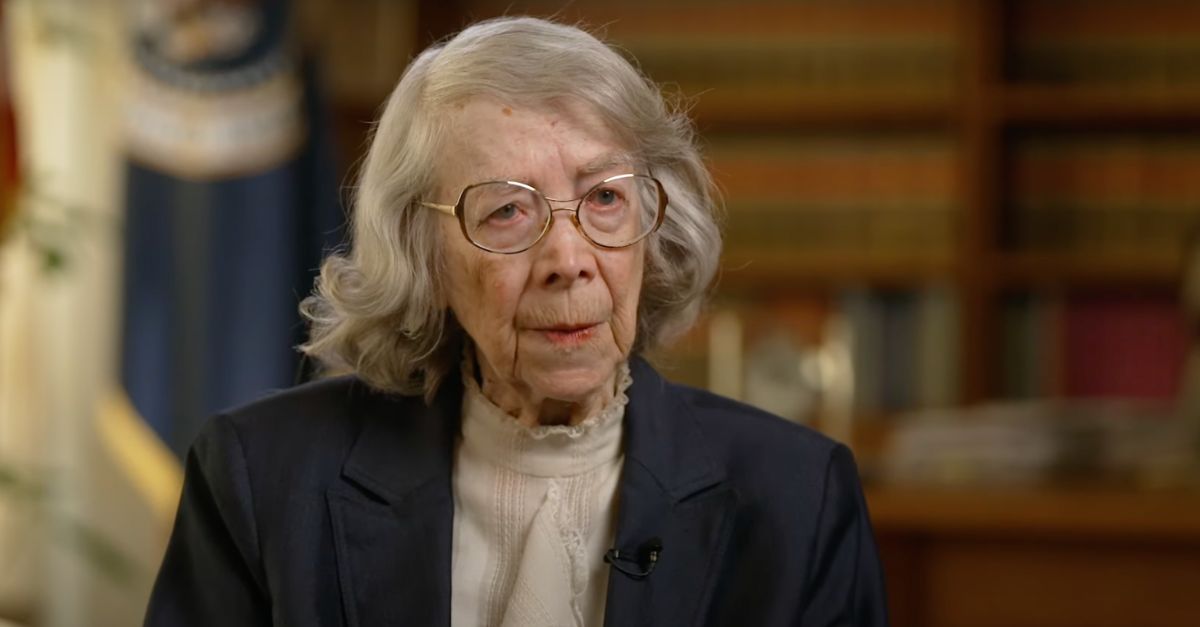
U.S. Circuit Judge Pauline Newman (YouTube).
A judicial counsel battling against the nation’s oldest sitting federal judge says that she could potentially end the suspension she is fighting — if only she would cooperate with the investigation into her mental health.
As Law&Crime has previously reported, U.S. Circuit Judge Pauline Newman, 97, was placed on temporary suspension after complaints about her demeanor and actions at work sparked an investigation. Her judicial colleagues reported concerning behaviors including delays in the judge’s work and habitual confusion, and the circuit launched an investigation into the judge’s mental health.
Newman did not cooperate with the investigation. The Committee on Judicial Conduct and Disability ultimately made a finding based on what it called “overwhelming evidence” of Newman’s memory loss, lack of comprehension, and confusion, and directed the judge to undergo a 30-45 minute interview with a neurologist and a full neuropsychological examination.
Newman refused, and the committee responded with a suspension order that blocked Newman from receiving any new case assignments. Newman sued Chief Circuit Judge Kimberly A. Moore and all the other Federal Circuit judges on the committee. She was represented in the lawsuit by New Civil Liberties Alliance (NCLA), a public-interest law firm linked to conservative backers that focuses on the so-called “administrative state.”
U.S. District Judge Christopher R. Cooper, a Barack Obama appointee, threw out most of Newman’s lawsuit in February, then dismissed the entire case on the pleadings in July. In his 15-page ruling, Cooper did not focus the factual allegations against Newman. Rather, the ruling was confined primarily to rejecting the legal challenges Newman had raised to the Judicial Conduct & Disability Act itself.
Newman appealed in July, and has also argued for the unsealing of documents related to the investigation, accusing the judicial counsel of trying to “control a media narrative” about her mental health.
On Thursday, the Judicial Council of the Federal Circuit filed a brief opposing Newman’s appeal of the district court dismissal. The council says that Newman’s claim — that the suspension is unconstitutional — doesn’t hold up.
After noting that the only legal question “properly before this Court” is whether the Judicial Conduct and Disability Act is “facially constitutional,” the council says that Newman’s challenge to the act is “meritless.”
“Plaintiff’s facial constitutional challenge to the Act is meritless,” the brief says. “Plaintiff contends that the Act violates Article III on its face because it authorizes the temporary suspension of a judge from hearing new cases, which Plaintiff contends is equivalent to an unlawful removal without impeachment.”
The brief goes on:
In any event, a temporary suspension from hearing new cases is not equivalent to removal. The Act itself makes clear that Congress considered such time limited suspensions distinct from “removal” from office. By definition, a “temporary” diminution in duties is not a “removal.” And since 1980, when Congress crafted [the statute], federal law has made clear that the judicial office Plaintiff holds (like all circuit and district court judges) includes the possibility of a time-limited suspension from hearing new cases. That this condition on Plaintiff’s office has been triggered does not mean she no longer holds office at all.
The council goes on to say that Newman’s challenges “are not properly before” the appeals court — but that even if jurisdiction was proper, her arguments would fail. According to the council, Newman herself could end the suspension by simply cooperating with the investigation.
“Plaintiff has not been effectively removed from office,” the brief says. “The relevant judicial council orders could not be clearer that Plaintiff has been only temporarily suspended from new case assignments, subject to reconsideration if she ceases refusing to comply with the Special Committee’s investigation.”
“The keys to the suspension are in her pocket,” the filing adds.
Nor is Newman’s removal from the bench a certainty, the council argues.
“Even while her noncompliance continues, the suspension orders apply ‘on a temporary basis for a time certain,”” the filing says (citations omitted). “As the JC&D Committee agreed, a one-year suspension, subject to renewal, is an appropriate sanction, entirely in keeping with other suspensions for other misconduct. And the September 2024 renewal process made clear that renewals of Plaintiff’s suspension are far from automatic or open-ended. The Special Committee and Judicial Council carefully considered Plaintiff’s arguments that renewal was unwarranted in light of any changed circumstances before imposing a new, temporary suspension.”
Another of Newman’s arguments — that due process entitles her to transfer to another circuit’s judicial council — “fares no better,” the brief argues.
“Nothing in the Act itself suggests that transfers are ever compulsory, and the Chief Judge and Judicial Council concluded properly — as affirmed by the JC&D Committee — that the type of ‘exceptional circumstances’ that would justify a transfer under the Rules are not present here,” the file says (citations omitted). “That the subject judge is a circuit judge and thus a colleague of the chief judge’s, for example, or that the subject judge is dissatisfied with the decisions of her home circuit’s judicial council, cannot alone be sufficient.”
“Throughout these proceedings, which have featured multiple rounds of briefing and oral argument, Plaintiff has received far more process than the constitutional minimum guaranteed by the Fifth Amendment,” the council adds.
Newman was appointed in 1984 by President Ronald Reagan and was the first judge appointed directly to the Federal Circuit where she “served with distinction” for almost 40 years.
Elura Nanos and Chris Perez contributed to this report.







